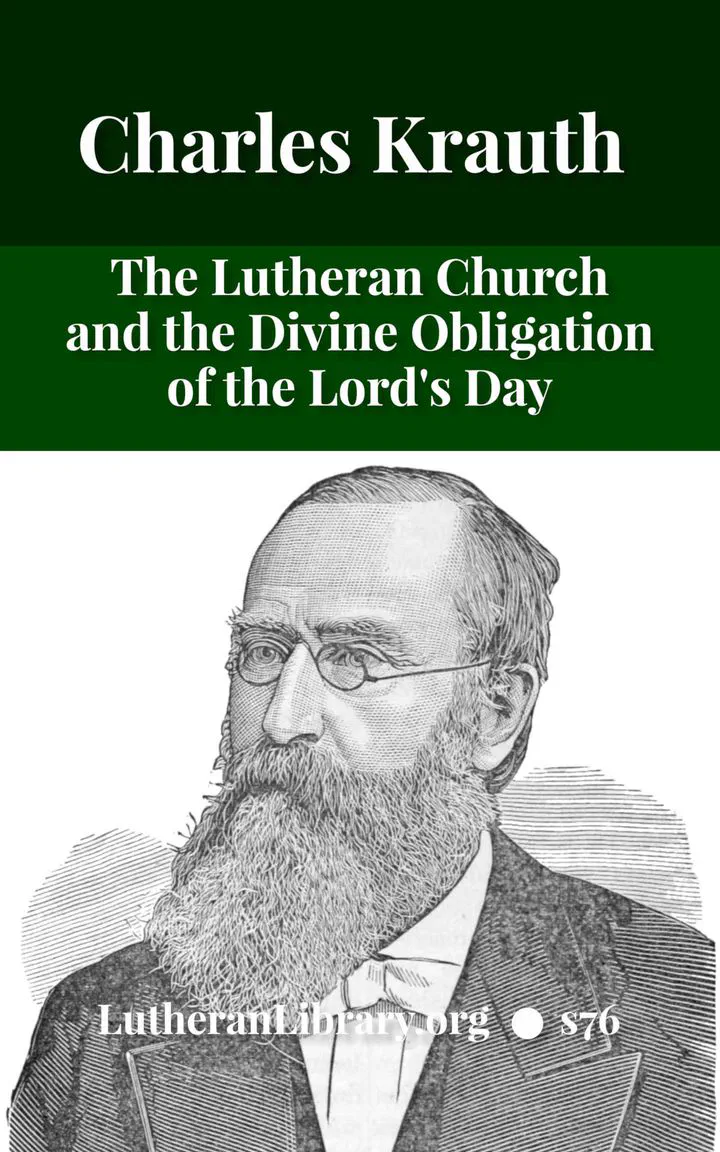The Lutheran Church and the Lord's Day by Charles Krauth [Journal Article]

“In exhibiting the earliest and purest views of our church on the divine obligation of the Christian Sabbath, we propose to present first of all, the views of Luther and Melanchthon…”
A giant of the faith, Charles Porterfield Krauth (1823-1883) is one of the most prominent American Lutheran scholars, perhaps best known for his masterful and essential volume, The Conservative Reformation and Its Theology As Represented in the Augsburg Confession and in the History and Literature of the Evangelical Lutheran Church. He served congregations in Baltimore, Pittsburgh, Virginia and in the Virgin Islands, and later edited the Lutheran and Missionary and Evangelical Review journals. Rev. Krauth was instrumental in the establishment of the General Council and the Lutheran Seminary at Philadelphia, which he led. Dr. Krauth was professor of intellectual and moral philosophy and vice-provost at the University of Pennsylvania.
Level of Difficulty: Intermediate: Some subject matter knowledge helpful.
Book Contents
- The Lutheran Church And The Divine Obligation Of The Lord’s Day.
- Luther’s Views of the Sabbath.
- I. The Sabbath Original and Natural.
- II. The Jewish Sabbath.
- III. The Sabbath designed for all Men.
- IV. One day in seven for the service of God, moral and perpetual.
- V. Not now the seventh day or Saturday.
- VI. But Sunday, “The day of the Lord.”
- VII. — Obligation of the Lord’s day, and sin of violating it.
- Melanchthon’s Views of the Sabbath.
- I. From the “Catechism for Youth.” — (1536.)
- II. From The Augsburg Confession, (The Variata) of 1540.
- III. From the Loci Communes, edition of 1545.
- IV. — From the “Earlier Exposition of the Nicene Creed.” (1550)
- V. — From the Later Exposition of the Nicene Creed. (1557.)
- VI. From the Annotations on the Gospels for the Year.
- The Augsburg Confession and the Lord’s Day.
- I. The relation to this point of the General Synod’s Doctrinal Basis.
- II. — The relation of those to it who subscribe the Augsburg Confession without qualification.
- III. — The Words in Dispute.
- IV. — General Position of the Lutheran Church on the Sabbath Question.
- V. — Great importance of the point discussed.
- VI. — The horns of a dilemma.
- VII. — Compressed statement of the points of difference between Rome and the Confessors.
- VIII. Proofs of the Position taken.
- The Augsburg Confession and The Apostolic Institution of the Lord’s Day.
- Luther on the Apostolic Institution of the Lord’s Day.
- 2 Melanchthon on the Apostolic Institution of the Lord’s Day.
- 3 Views of the Lutheran Theologians.
- 4 The Original Edition of the Confession.
- The words of the Augsburg Confession in its original form.
- Views of the greatest Writers on the Confession as to its meaning.
- Carpzov.
- Walch
- Chemnitz.
- Lyser.
- Gerhard.
- Calovius.
- Quenstedt.
- Spener.
Publication Information
- Lutheran Library edition first published: 2020
- Copyright: CC BY 4.0